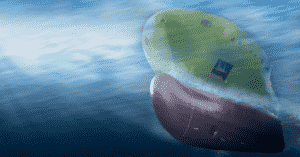How Bow Thruster is Used for Maneuvering a Ship?

Handling a ship in currents, wind and tide is always a tricky affair. All these three factors can laterally shift the vessel from its course. A ship’s pilot has to keep an eye to these effects and constantly take remedial measures for safe navigation of the ship.
Berthing in heavy wind and tide situations is generally assisted by tags – be it a towing tug or a checking tug or a tug that imparts athwartship force to counter lateral drift. These are additional to the already existing ship’s engines, rudder and thrusters (if installed).
Now at any given time, the berthing speed is always on the lower side. It is best to keep it less than two knots under most circumstances. Bow or stern thrusters, which impart lateral or athwartship forces, are effective only when the speed is on the lower side. They dampen the impact of the vessel when it falls on the pier or berth.
When the bow is falling heavily on the jetty, the bow thruster is run to port or starboard, as the case may
Content Original Link:
" target="_blank">



































































